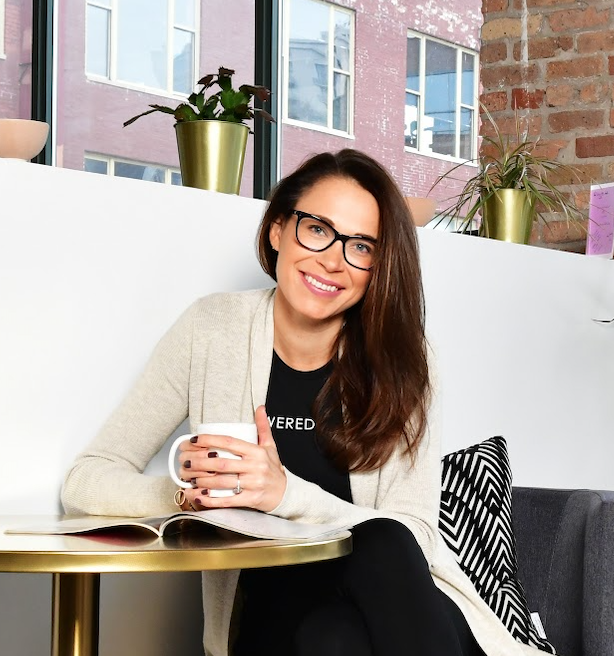I always took my vision for granted. Until one March in my mid-thirties, I no longer had that privilege. Spontaneously, on my morning commute into work, the retina of my left eye had a series of strokes. The burst blood vessels produced “cotton wool spots,” significantly impairing my vision like an aura side effect of a migraine. Only, unlike the few migraines I had experienced over the years, my vision didn’t clear.
I couldn’t read the large font in my two-year old son’s board books, let alone a client email or my team’s quarterly P&L report. Light, particularly anything backlit, made me nauseous. I lay in a dark room for days between appointments with specialists. Despite brain MRIs, dexterity exams and weekly blood draws, there were no concrete answers as to why this had occurred nor as to when (if ever) my vision would return. I felt paralyzed, unable to function as a parent and a professional.
Then my grit kicked in.
It doesn’t come easily to me; not being in control is not in my nature. Yet, I had to accept the uncertainty of my health, acknowledge what was outside my control and embrace what I could impact: my attitude, my lifestyle, my priorities and my incredible personal and professional community that championed me.
It took six months for my vision to heal and, to this day, we don’t know what caused the blood vessels to burst. My eyes get tired easily, so I am vigilant about monitoring my screen time. Clients and colleagues know that I walk into my office or a conference room and turn the lights off instead of on. I still don’t drive beyond a few-mile radius of my home. I’ve significantly altered my diet, eliminating gluten, dairy and alcohol; though, fortunately for everyone, coffee has remained a core staple. This is my new norm, my reality now. A reality that has refocused my priorities. One that has redefined my view of whole person success, whereby personal and professional achievements – and mental and physical health – are achieved as a collective and not at the expense of one another.
As my vision cleared, my need for agency took root.
It is no coincidence that I have since pivoted in several roles at new organizations. Professionally, I have clarified my sense of purpose and defined my own version of success. Am I adding value to my organization? Is my skillset and thought leadership continuing to grow and develop? Do I bring my authentic self to the table and, importantly, is she welcomed and respected?
Reflecting on my twenty-year career in the insurance industry and a decade as a parent, much of my professional self feels authentic. Yet, a key piece has been missing. Cultural alignment: specifically, the anemic diversity within C-Suites, leadership teams and talent pipelines despite numerous industry-wide efforts in recent years. This inequity is not aligned with my authentic self. With this clarity, I have further refined my whole-person objective. Going forward, I commit to be an agent for this critical change.
Like the prism embedded in the lens of my glasses to correct the angle at which an object meets my eye, the lens through which I view my role in driving this change has adjusted.
Therefore, I am thrilled to announce the January 2020 launch of Cultiver LLC (“Cultiver”), an advisory practice focused on fostering and advocating cultures of inclusion within the insurance industry and broader business community.
Why inclusion?
The benefits of diversity are compelling and increasingly well-recognized: exceeding corporate goals as well as historic performance, outperformance of peers, improved employee experience minimizing attrition and bolstering succession planning, accelerating innovation, to name but a few.
Less recognized, however, is the importance of inclusion. As culture-change catalyst Verna Myers is frequently quoted for saying, “Diversity is being invited to the party, inclusion is being asked to dance.” It is a culture of inclusion that is the imperative catalyst for building and advancing truly diverse talent pipelines and leadership teams and for fostering innovation within an organization.
Cultiver’s hybrid offering provides a comprehensive strategic approach to building and fostering inclusive cultures.
|
Consulting |
Developing and leading inclusive culture transformation for projects that range in scope from (for example): Inclusive Culture Target Initiatives, e.g. assessing and mitigating the impact unconscious bias has throughout the hiring process; a leadership development program designed to retain and advance a diverse talent pipeline; bolstering company policies and procedures to optimize inclusion of all colleagues and improve attrition, etc. to Inclusive Culture Strategic Plan, e.g. customizing an organizational mission statement and tailoring key inclusive culture strategic plan initiatives to: align the leadership team’s core business objectives with “pain points” identified through analysis of the current state of employee engagement; incorporate a roadmap for the plan’s execution; and articulate clear metrics of success to report back throughout the organization. |
|
|
Training & Development |
Designed to support key initiatives articulated in the organization’s Inclusive Culture Strategic Plan as developed at the onset of Cultiver’s consulting engagement. |
|
|
Executive Coaching |
Supporting key Inclusive Culture Initiatives identified in Cultiver’s consulting engagement. In addition to corporate clients, Cultiver offers a private coaching practice targeting women as rising leaders, executives and board members. |
|
|
Advocacy |
Bolstering client advocacy of cultures of inclusion initiatives through collaboration on internal & industry events (e.g. planning, speaking, panel discussions, etc.) and publications (e.g. articles, white papers, etc.) Elevating visibility of the importance of diversity, inclusion and the advancement of women through: Key Note speeches, Ted-X like talks, panel discussions, pod-casts, a monthly series on the imperative of using our individual and collective voices as well as planning and hosting of industry inclusion events. |
Strategic Partnerships with thought-leaders, coaches and training and development experts leverage Cultiver’s platform and enhance its strategic offering. CEO and Founder of Wet Cement, Jennifer Willey is a premier Cultiver strategic partner aligned in her commitment to truly drive change. Wet Cement’s consulting and coaching offerings complement Cultiver’s and its research-based, experienced-led training curriculum bolsters Cultiver’s core training and development offering.
Further ensuring a broad and inclusive lens guides the strategic growth of Cultiver, an Advisory Board is in its formation. Inclusion and diversity experts (representing numerous industries, life experiences and perspectives) will comprise this Board to advise, challenge and hold me accountable in executing on Cultiver’s mission.
As Cultiver launches, I look forward to the new year, the new decade and to embrace this opportunity to:
Challenge the status quo,
Grow my network and collaborate with strategic partners,
Elevate visibility of the imperative for cultures of inclusion, and
Collectively drive change towards a more inclusive workforce and society.


